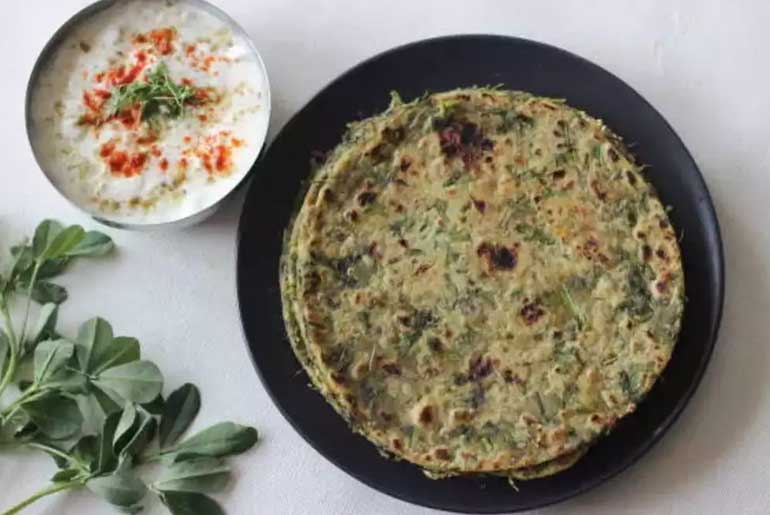Methi paratha is not only a delicious and nourishing breakfast option but also serves as a satisfying meal that can keep hunger at bay until lunchtime, especially during the winter season. As winter approaches, the enticing aroma of fresh fenugreek leaves fills the kitchen, adding to the charm of the season.
To prepare this delightful dish, finely chopped methi leaves are combined with wheat flour, salt, spices, and a touch of oil to form a dough. The dough is then rolled out and cooked on a tawa until it achieves a golden brown hue. Methi paratha is a favorite among food enthusiasts and is typically enjoyed with accompaniments such as salad, raita, or chutney.
Beyond its crispy and delicious appeal, methi paratha offers potential benefits for those looking to manage their weight, especially during the winter months when increased appetite may lead to indulgence in unhealthy foods. Fenugreek, or methi, is a rich source of dietary fiber, vitamins, protein, minerals, and iron. Consuming methi paratha for breakfast can help keep hunger pangs at bay for an extended period, promoting a sense of fullness until lunchtime.
Incorporating this nutritious and flavorful dish into your winter breakfast routine not only satisfies your taste buds but also contributes to a healthy and satiating start to the day.
Benefits of Relishing Methi Paratha in Winters:
1. Increased Satiety:
The soluble fiber in fenugreek creates a gel-like substance in the stomach, promoting a sense of fullness and helping control appetite, preventing overeating.
2. Regulation of Blood Sugar Levels:
Fenugreek may assist in regulating blood sugar levels by slowing down the absorption of sugars in the stomach, reducing the likelihood of insulin spikes associated with increased fat storage.
3. Metabolism Boost:
Studies suggest that fenugreek may positively impact metabolic rate, potentially aiding in calorie burning.
4. Low in Calories:
Methi paratha can be a relatively low-calorie option compared to some other foods, making it suitable for those aiming to reduce calorie intake.
Health Benefits of Fenugreek, the Main Ingredient:
1. Rich in Fiber:
Fenugreek is high in soluble fiber, promoting digestive health and preventing constipation.
2. Blood Sugar Regulation:
Fenugreek helps regulate blood sugar levels by improving insulin sensitivity and slowing down sugar absorption.
3. Heart Health:
The fiber content contributes to heart health by helping lower cholesterol levels.
4. Weight Management:
Fenugreek’s fiber aids in weight management by promoting a feeling of fullness.
5. Anti-Inflammatory Properties:
Fenugreek exhibits anti-inflammatory effects beneficial for conditions like arthritis and other inflammatory disorders.
6. Breastfeeding Support:
Fenugreek stimulates milk production in breastfeeding mothers.
7. Antioxidant Effects:
Fenugreek contains antioxidants that combat oxidative stress, protecting cells from damage.
8. Aid in Digestion:
Fenugreek helps alleviate indigestion and acid reflux by forming a protective layer on the stomach lining.
9. Menstrual Health:
Fenugreek is believed to regulate menstrual cycles and alleviate PMS symptoms.
10. Improved Skin Health:
Antioxidants and anti-inflammatory properties contribute to healthier skin.
Relishing methi paratha in winters not only satisfies the taste buds but also provides a range of health benefits, making it a nutritious and wholesome choice for the season.
Disclaimer:
The information contained in this article is for educational and informational purposes only and is not intended as a health advice. We would ask you to consult a qualified professional or medical expert to gain additional knowledge before you choose to consume any product or perform any exercise.








